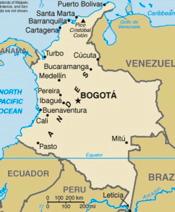PUERTO ASIS, Colombia -- About a year ago, Carolina saw the fumigation planes flying low over her family's farm near the Ecuadorian border here. They were trailed by clouds of herbicide, which killed the family's crops of coffee, yucca, peanuts and bananas. The United States-financed spraying is supposed to kill illegal coca bushes, the base ingredient for making cocaine. But Carolina said her family had no coca, although many of their neighbors did. "They fumigated the whole land, corn, rice, bananas, pineapples and forage," she said. "The three animals we had, cows and calves, died three weeks later." While she is only 24, the incident last January was not the first time this young woman has suffered impacts from Colombia's four-decade-long civil war and the trade in illegal drugs that continues to finance much of the nation's violence. A decade ago, Carolina witnessed a massacre by soldiers, and then another massacre by the military's right-wing paramilitary allies. Then, in early 2005, Marxist guerrillas visited her family's farm and took away her husband to make him a fighter. She has not heard from him since.
Colombian Coca Fumigation Causes Rifts in South American Relations

